We love it when businesses, especially big ones, decide to change their policies to reduce their impact on the planet. In fact, encouraging them to do so is part of why we exist! But sometimes, businesses seem to forget that when they make these promises, they have to actually follow through with genuine, sustained action.
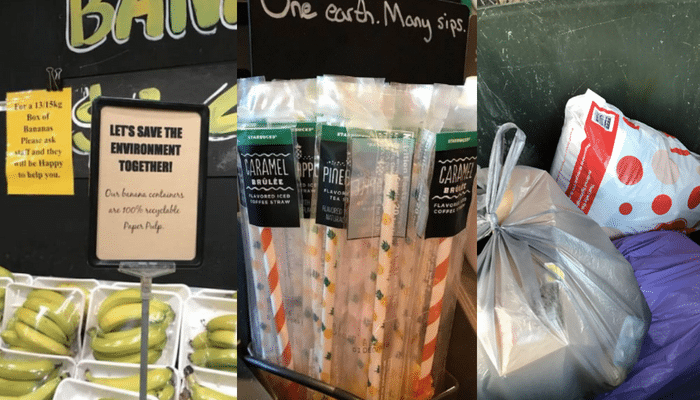
Check out the below examples for proof that not all green initiatives are created equal!
1. Coles’ single-use plastic bag ban… that may or may not happen.
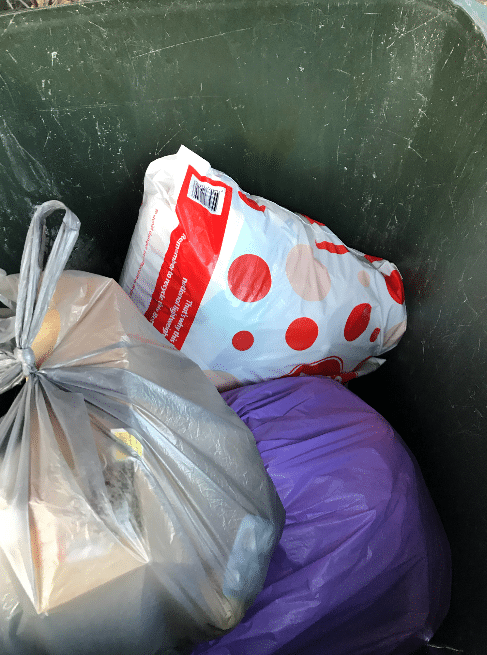
What a saga this has been! After the impact of plastic pollution began to feature prominently in the nation’s consciousness, both Coles and Woolworths decided that they wanted to get on board the plastic-free train too. All good and well, right? This would keep as much as 3.2 billion single-use bags each year out of landfill and our oceans.
That’s if they actually do it. On top of the irony of introducing a thicker “reusable” plastic version of their single-use bags for 15 cents, after only five days of the ban being in place, Coles changed their mind and offered complimentary plastic bags for 10 days. Then, they went back to charging customers 15 cents for the bags for two days. THEN they backflipped again and gave out bags for free. Coles are now saying that they will, in fact, phase out bags and have announced a deadline. But will they actually stick to their commitment this time?
If you want to make sure Coles ban the bag for good, be sure to add your voice to our petition.
2. Starbucks is phasing out single-use plastic straws! But then…
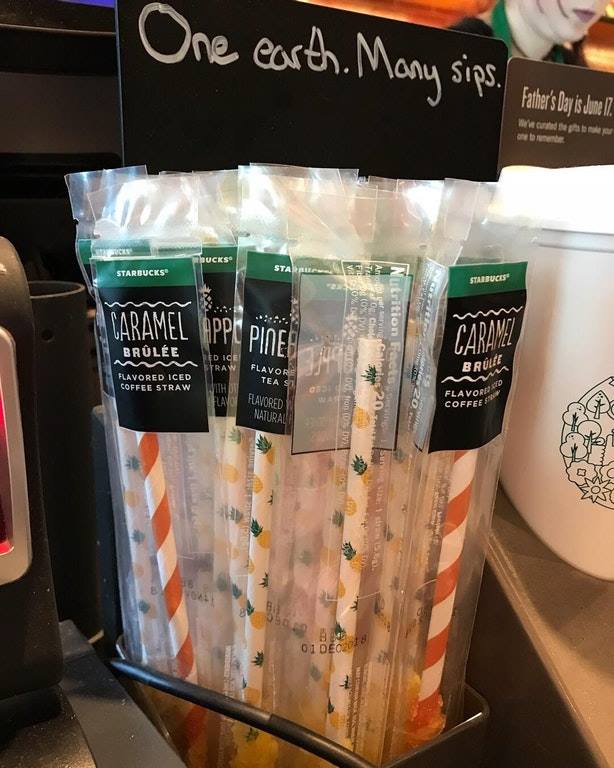
“One earth. Many sips.” Source: Reddit, /u/mitbroetchen
The biggest coffee shop chain worldwide, with over 28 thousand locations all over the globe, officially announced that they will ditch the plastic straw by 2020! That would eliminate more than one billion straws a year. Amazing news, since disposable straws always and end up in either landfill or our environment because they are simply too small to be recycled.
But just a few days after this announcement, this picture went viral, and the internet collectively face-palmed. An “earth-friendly” paper straw, that comes wrapped in – guess what – plastic.
That really sucks, Starbucks. Please try again.
3. The catastrophe that is Coles’ ‘Little Shop’
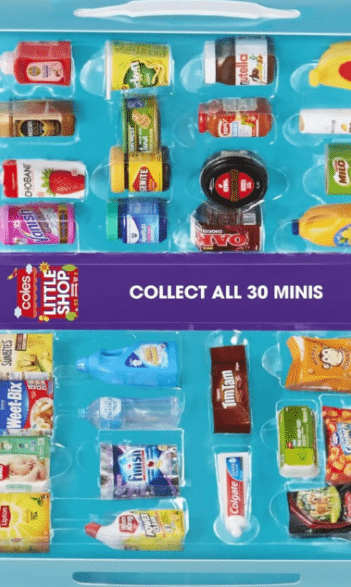
Ok, so this is an actual thing, just in case you thought we dreamed up the worst possible product for the planet for fun.
Just a few weeks after they introduced the ban on lightweight plastic bags nationwide, and announced a suite of great environmental initiatives to do with food waste and plastic-wrapped produce, they brought in the “Little Shop” promotion. In this promotion, customers are offered a miniature version of 30 well-known household products with every $30 spent.
Miniature products made from plastic, wrapped in plastic, wrapped in a big plastic display box. Um, Coles?
4. Another not so “a-peel-ing” case of environment saving packaging
Another example of a retailer completely missing the point when trying to be more environmentally friendly was found at a farmers market in Perth. There, bunches of bananas were packaged on a compostable container, yet encased tightly in plastic cling wrap.
The display was even accompanied by a sign promoting this “environment-saving” product! Even though the intentions here may have been good, this market grocer still has a long way to go when it comes to reducing their impact in a way that’s meaningful. Good on them for trying, though.
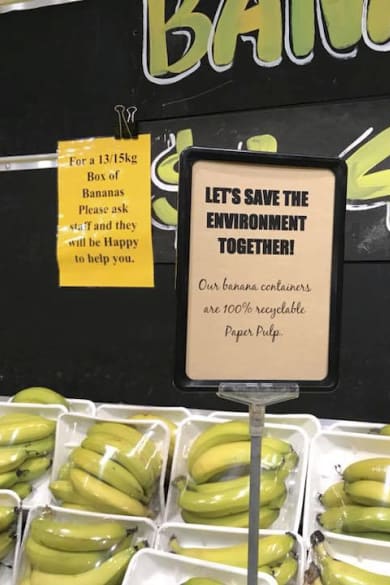
Thanks a bunch, but this sell is not very thought through.
5. The confusing moment when ‘eco-friendly’ or bulk products are wrapped in plastic.
Buying in bulk is also a great way to skip excessive plastic wrapping. Much like if you were to order a bulk-sized supply of cotton swabs. Of course you made sure to choose the plastic-free version, made only from bamboo and cotton. And then your parcel arrives and inside you find individual, plastic wrapped bundles of swabs. What a frustrating and disheartening experience…

Credit: WA Today
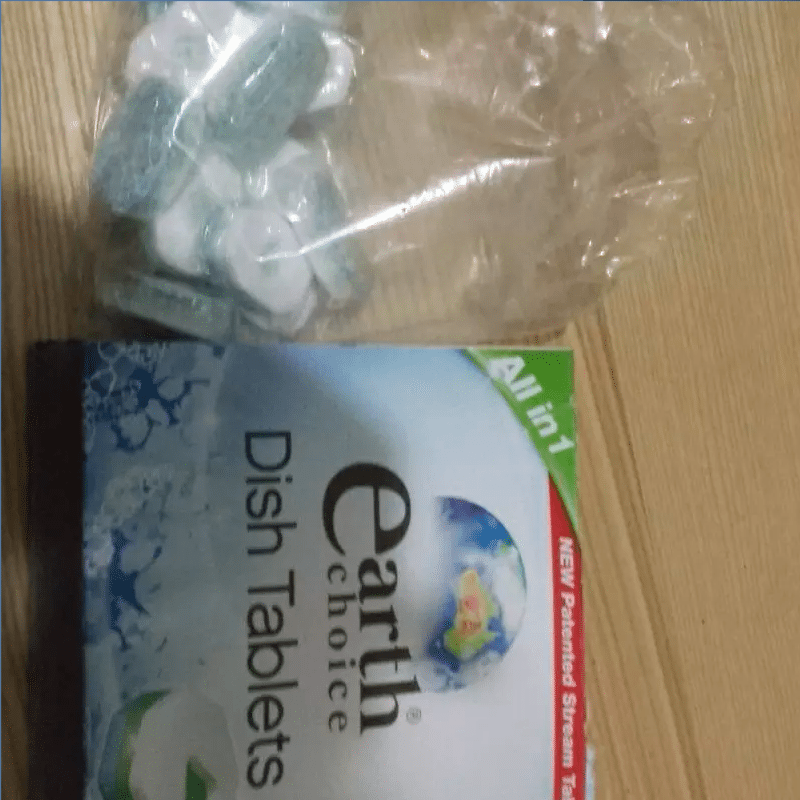
Plastic-wrapped dishwasher tablets in a plastic bag. “Earth Choice.” Credit: WA Today
Efforts companies and retailers make to reduce their contribution to plastic pollution is commendable, but the sentiment should be applied to all of their following actions. We need genuine, impactful change – otherwise it’s just greenwashing. So whenever a company announces that they’re going greener, make sure you hold them accountable, and call them out if they don’t uphold their promise!


